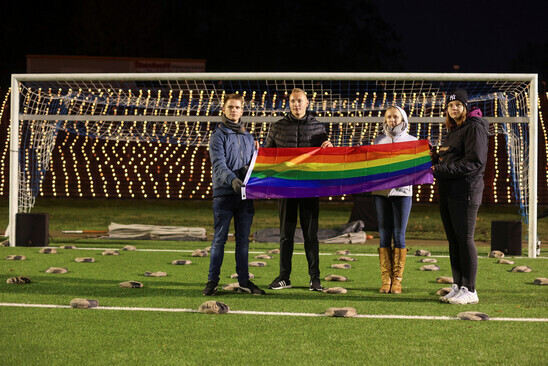hankyoreh
Links to other country sites 다른 나라 사이트 링크
[Correspondent’s column] Germany’s anger over World Cup is about more than losing


By Noh Ji-won, Berlin correspondent
In preparation for leaving to become the Hankyoreh’s Berlin correspondent in November, I kept note of the overall atmosphere of German society before the World Cup. Germany, a four-time World Cup winner, lost 2-0 to South Korea four years ago and failed to place in the Round of 16. I was under the impression that they would be busy preparing for revenge.
However, it was hard to sense any sort of enthusiasm for the World Cup among the German public. The disinterest was only exacerbated by comments made by the World Cup 2022 Qatar ambassador Khalid Salman on German television, in which he said that homosexuality was “damage in the mind.”
On German Twitter, a hashtag protesting the country’s participation in the World Cup started to trend (#BoycottQatar2022). In sports stadiums across the country, candlelight vigils were held in memory of the many migrant workers who died in Qatar. Some pubs are refusing to play the matches altogether.
According to a survey by the University of Hohenheim, around half of all Germans support companies and politicians who are boycotting the Qatar World Cup. More than two-thirds of citizens believe there to be no need for their chancellor to sit in the stands for or watch the games. The biggest LGBTIQ+ rights organization in Germany, LSVD, demanded that the government issue a travel warning for Qatar, as it is a country where queer folk can face up to seven years in prison.
When FIFA banned seven European soccer teams from wearing rainbow “One Love” armbands and even threatened to sanction those who wore them with yellow cards, lack of interest gave way to rage. These armbands symbolize opposition to all kinds of discrimination, including those on the basis of race, skin color, sexual orientation, culture, beliefs, nationality, gender and age.
“Standing up against discrimination is something that Germany considers very important. The actions of the German national team are very disappointing. They should’ve been ready to get yellow cards.”
Daniel, who lives in Berlin, became angry after the mention of the country’s first match, which was against Japan, on Nov. 23. He was not angry about the fact that the country lost to Japan, but because he felt the national team was being cowardly.
Before the match, the German national team protested FIFA’s decision to ban rainbow armbands by posing and covering their mouths. Nancy Faeser, the German interior minister, wore a One Love armband as she sat next to FIFA President Gianni Infantino. However, Daniel still criticized the German national team by saying, “look at how the Iranian national team were silent and didn’t sing along to their national anthem,” and, “if they had stood in solidarity with the other seven teams and boycotted the games, FIFA wouldn’t have been able to act like that.”
It is easy to see how seriously Germany takes the principle of anti-discrimination by looking at its policies. Germany enacted anti-discrimination legislation known as the General Equal Treatment Act in 2006 and legalized same-sex marriage in 2017.
Germany’s traffic light coalition, which went into effect last year, created a committee for LGBTIQ+ issues for the first time in German history, and announced a national action plan called “Queer Living” (Queer Leben). This action plan includes “self-determination laws” that would allow people to designate their gender identity and would introduce anti-violence programs.
Political pressure is growing stronger as the public becomes more vocal in its opposition to discrimination.
While I had started by asking “Why is Germany so critical of the Qatar World Cup?” soon I found myself asking “When will Korea share the same values?” It has been 15 years since the Roh Moo-hyun administration proposed anti-discrimination legislation in 2007. This bill, which has failed to advance further in any National Assembly, is still up in the air in the current 21st National Assembly.
On Nov. 15, the Democratic Party of Korea reportedly included an anti-discrimination act as a high-priority bill. According to a poll held by the National Human Rights Commission of Korea in April, 67.2% of respondents agreed on the need for an anti-discrimination act in the country.
It seems that Korean citizens, too, are ready.
Please direct questions or comments to [english@hani.co.kr]

Editorial・opinion
![[Editorial] Intensifying US-China rivalry means Seoul must address uncertainty with Beijing sooner than later [Editorial] Intensifying US-China rivalry means Seoul must address uncertainty with Beijing sooner than later](https://flexible.img.hani.co.kr/flexible/normal/500/300/imgdb/original/2024/0517/8117159322045222.jpg) [Editorial] Intensifying US-China rivalry means Seoul must address uncertainty with Beijing sooner than later
[Editorial] Intensifying US-China rivalry means Seoul must address uncertainty with Beijing sooner than later![[Column] When ‘fairness’ means hate and violence [Column] When ‘fairness’ means hate and violence](https://flexible.img.hani.co.kr/flexible/normal/500/300/imgdb/original/2024/0516/7417158465908824.jpg) [Column] When ‘fairness’ means hate and violence
[Column] When ‘fairness’ means hate and violence- [Editorial] Yoon must stop abusing authority to shield himself from investigation
- [Column] US troop withdrawal from Korea could be the Acheson Line all over
- [Column] How to win back readers who’ve turned to YouTube for news
- [Column] Welcome to the president’s pity party
- [Editorial] Korea must respond firmly to Japan’s attempt to usurp Line
- [Editorial] Transfers of prosecutors investigating Korea’s first lady send chilling message
- [Column] Will Seoul’s ties with Moscow really recover on their own?
- [Column] Samsung’s ‘lost decade’ and Lee Jae-yong’s mismatched chopsticks
Most viewed articles
- 1For new generation of Chinese artists, discontent is disobedience
- 2[Editorial] Transfers of prosecutors investigating Korea’s first lady send chilling message
- 3[Exclusive] Unearthed memo suggests Gwangju Uprising missing may have been cremated
- 4[Editorial] Intensifying US-China rivalry means Seoul must address uncertainty with Beijing sooner t
- 5S. Korea “monitoring developments” after report of secret Chinese police station in Seoul
- 6N. Korean media upgrades epithet for leader’s daughter from “beloved” to “respected”
- 7Yoon says concern about biased diplomacy is being incited by “communist totalitarian forces”
- 8[Column] US troop withdrawal from Korea could be the Acheson Line all over
- 9Xi, Putin ‘oppose acts of military intimidation’ against N. Korea by US in joint statement
- 1060% of young Koreans see no need to have kids after marriage